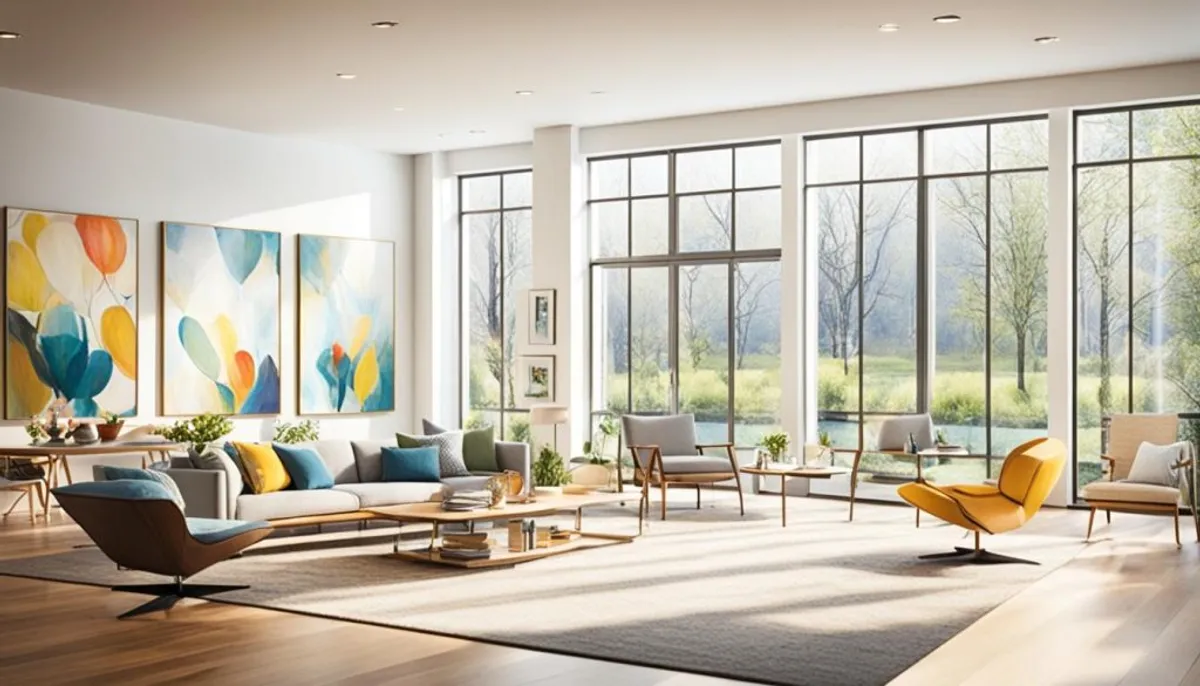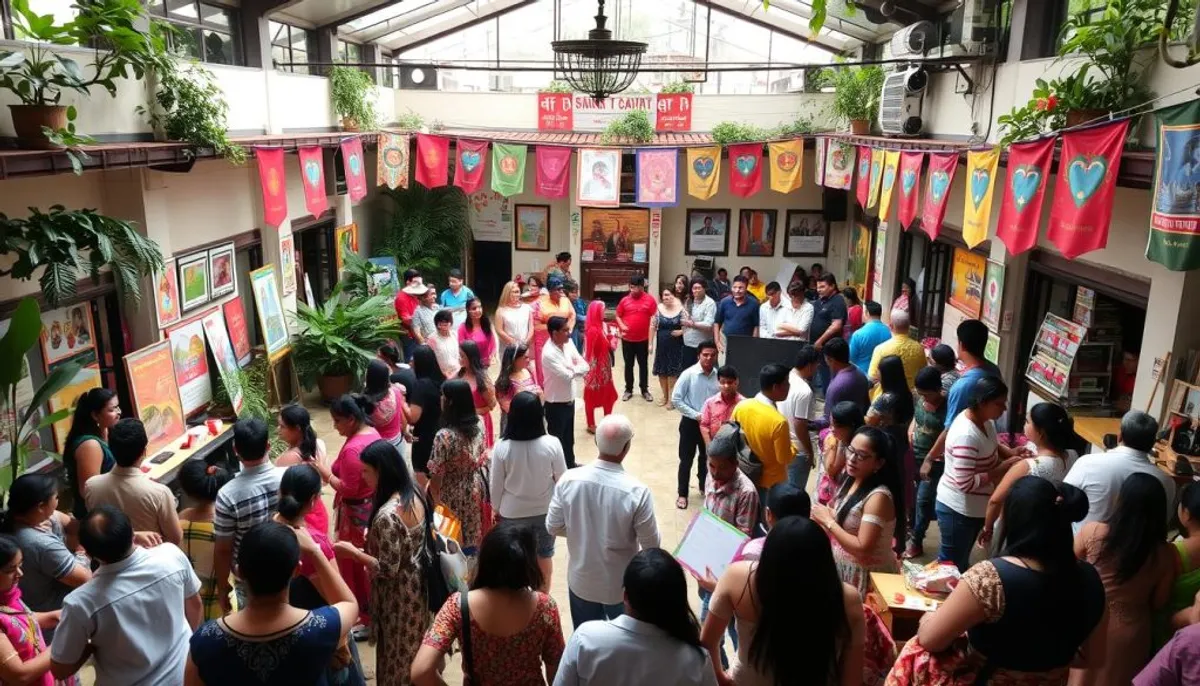The cultural space occupies a central place in our society. It is a meeting place where cultures intersect and enrich each other. In France, the Pompidou Center in Paris is a perfect example of this function.
Cultural centers offer a diversity of activities. They range from exhibitions to concerts, including workshops and lectures. These places stimulate curiosity and encourage intercultural exchanges. They are open to everyone, whether they are local residents, foreigners, or tourists eager to discover.

The Jean Vilar Cultural Center is a striking example. Its unique structure, with its truncated pyramid, symbolizes its role as a cultural crossroads. Its three levels and circular theater create a perfect environment for artistic exchanges.
French cultural centers have a global influence. The French alliances abroad make them ambassadors of culture. They facilitate international artistic exchanges. Thus, the cultural space becomes a bridge between cultures and traditions.
Cultural centers in France: a mission of exchange and sharing
France is rich in a network of cultural centers, essential for intercultural dialogue. This network, composed of 96 French Institutes and over 800 French Alliances, with 307 accredited by the Ministry of Europe and Foreign Affairs, plays a fundamental role. It aims to promote French culture abroad and foster cultural exchange.

A space for intercultural dialogue
Annually, these cultural centers organize over 50,000 cultural activities. These events encourage intercultural dialogue, bringing together individuals from diverse backgrounds. Their network involves thousands of organizations and attracts hundreds of thousands of participants, including students and volunteers.
The diversity of activities offered
Cultural centers offer a variety of cultural activities. They encourage international artistic exchanges, share French intellectual creation, and disseminate French cinematic and audiovisual heritage. In 2022, 15% of volunteers in civic service abroad were engaged in the cultural field.
The importance of cultural accessibility
Cultural accessibility is a priority for French cultural centers. They aim to make culture accessible to all, often offering free or reduced-price activities. The Cooperation and Cultural Action Service (SCAC) works closely with French Institutes and local partners to promote culture and French training.
| Type of establishment | Number | Supervision |
|---|---|---|
| French Institutes | 96 | Ministry of Foreign Affairs |
| French Alliances | 800+ | 307 accredited by the ministry |
| Annual cultural actions | 50,000+ | Cultural cooperation network |
Why the cultural center is essential to local life
The cultural center is a fundamental pillar in local life. It promotes social cohesion and cultural development. Its impact is palpable through various initiatives that enrich community life.
Local festivals and celebrations, orchestrated by these centers, inject new dynamics into rural areas. Hosting resident artists enhances local heritage and stimulates creativity. These cultural actions, especially those for children, foster intergenerational ties and strengthen the social fabric.

Cultural facilities, such as libraries, media libraries, and museums, are crucial for the vitality of a town center. The rehabilitation of buildings to house them contributes to the preservation of architectural heritage.
The "Action Heart of the City" program illustrates the national commitment to local culture. With 5 billion euros in investments planned over five years, it aims to revitalize 222 territories. This initiative highlights the importance of culture in urban renewal.
| Initiative | Impact |
|---|---|
| Local festivals | Revitalization of the territory |
| Artist residencies | Enhancement of heritage |
| Activities for children | Strengthening social ties |
| Building rehabilitation | Architectural preservation |
The commitment of elected officials and local actors is essential for the success of these cultural projects. They help create an environment conducive to the cultural flourishing of all residents. This strengthens the sense of belonging to the community, regardless of the age of the inhabitants.
The diverse cultural offerings of cultural centers
In France, cultural centers offer a range of varied activities. They are crucial for democratizing culture, making the artistic experience accessible to all.
Exhibitions and artistic events
Exhibitions are at the heart of the offerings of cultural centers. They showcase works by artists from all backgrounds, addressing different styles and mediums. These events stimulate curiosity and promote intercultural dialogue.
Workshops and training
Creative workshops and language training are highly sought after. They allow participants to refine their artistic skills and learn new languages. These activities encourage exchange and creativity.
Libraries and media libraries
The libraries of cultural centers are places of knowledge and discovery. They offer a wide selection of books, magazines, and digital resources in several languages. In the Pays d'Ancenis, 20% of the population is registered with BiblioFil, exceeding the national average of 17%.
Live performances and concerts
Cultural centers thrive on performances and concerts. They offer a variety of artistic genres, from theater to contemporary music. These events bring communities together and enrich local cultural life.
| Type of activity | Frequency | Target audience |
|---|---|---|
| Exhibitions | Monthly | All audiences |
| Workshops | Weekly | Adults and children |
| Performances | Bi-monthly | All audiences |
| Concerts | Monthly | Youths and adults |
The role of cultural centers in international promotion
Cultural centers are essential for promoting arts and traditions internationally. They serve as a bridge between cultures, facilitating exchanges and mutual understanding. This enriches global cultural diversity.
Foreign cultural institutes in Paris
Paris is home to 58 foreign cultural institutes, an unparalleled network. The Wallonia-Brussels Center and the Swedish Institute, for example, organize events to showcase their cultures. These initiatives enrich the culture of Paris and offer residents a global perspective.
International cultural exchanges
International exchanges are at the center of the action of cultural centers. In France, the Ministry of Culture collaborates with foreign partners for various projects. One example is the cooperation agreement with Canada for museums, establishing links between professionals.
The promotion of languages and traditions
The linguistic promotion is a crucial mission of cultural centers. They offer language courses, translation workshops, and events to celebrate local traditions. This approach helps preserve and disseminate intangible cultural heritage.
| Country | Number of cultural centers | Main activities |
|---|---|---|
| France | 1200 | Exhibitions, language courses, cultural exchanges |
| Belgium (Wallonia-Brussels) | 117 | Festivals, artistic workshops, heritage promotion |
| Canada | 85 | Museum cooperation, professional exchanges |
Conclusion
The importance of cultural centers in our society is undeniable. They promote cultural enrichment and intercultural dialogue, essential for social cohesion. In Paris, the nerve center of French culture, an impressive concentration of cultural offerings is manifested. 84% of publishing houses and 77% of the most visited museums are located there.
Cultural centers play a crucial role in democratizing access to culture. They offer a variety of activities, ranging from exhibitions to workshops, including live performances. This diversity allows them to reach a wide audience and meet the varied needs of the population in terms of cultural and educational leisure.
Ultimately, cultural centers are pillars of personal and collective enrichment. They contribute to the cultural vitality of our societies, foster mutual understanding, and stimulate creativity. Their presence in our cities and villages is a valuable asset for the cultural and social development of our communities.
RelatedRelated articles


